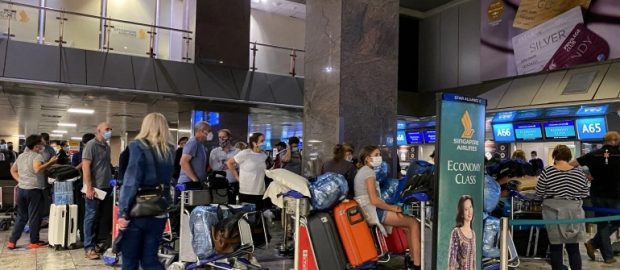“Unjustified”, “draconian” and “counterproductive” – these are just some of words used by South Africa’s health minister as he criticised countries around the world that decided to restrict travel from the country and its neighbours in an attempt to contain the spread of a new coronavirus variant.
The strain – designated a “variant of concern” on Friday by the World Health Organization (WHO), which also named it Omicron after a letter in the Greek alphabet – has been blamed for a surge in new infections in South Africa.
Omicron has also been detected in Belgium, Botswana, Hong Kong and Israel.
“We believe that some of the reactions have been unjustified,” Health Minister Joe Phaahla told reporters, accusing leaders of “finding scapegoats to deal with what is a worldwide problem”.
‘Wrong approach’
Austria, Canada, France, Germany, Italy, the Netherlands and the United States were among those on Friday that joined the United Kingdom in restricting flights from southern Africa.
The European Commission, the executive arm of the 27-nation European Union, also proposed a complete suspension of flights to and from the region until there was a “clear understanding about the danger” that it said was posed by the new variant.
However, the WHO on Friday urged against travel curbs at this stage. The United Nations’ health agency cautioned that it could take several weeks to find out whether the newly-discovered mutations made the virus more virulent or transmissible.
Phaala said that bans were “a wrong approach – it’s misdirected and goes against the norms and advice by the WHO”.
The restrictions have sent shockwaves through South Africa’s tourist industry, which has been looking to visitors from the wealthier northern hemisphere to bring in desperately-needed income.
At Johannesburg’s international airport, there was frustration early on Friday as dozens of people tried to return to the UK.
“It’s unfair, it’s unjustified, it’s abrupt and it’s not good for tourism for South Africa,” said a passenger of the ban.
Phaala, meanwhile, compared daily infections in South Africa and some European countries, saying it was ironic that “some of the countries … now reacting in this draconian manner” had infection rates of more than 50,000 per day.
That contrasts to South Africa which reported nearly 3,000 daily cases on Friday, up from approximately 300 daily cases two weeks ago.
“That kind of reaction is knee-jerk and panic,” he said, warning that such responses could prompt countries to shy away from reporting new findings.
“It’s a very counterproductive reaction because what it says is if you have the capability to do genomic sequencing and have high level of efficiency … those capabilities must be driven underground,” said Phaahla. People will “feel that it is a risk to disclose” their findings, he argued.
‘Vaccine apartheid’
Tulio de Oliveira, a leading virologist who announced the discovery of the variant, slammed the “radical decision” to suspend flights out of the region.
“Sometimes one gets punished for being transparent, and doing things very quick,” he told the same news conference.
He said he did not believe travel bans were effective, citing the US, the first country to have imposed a travel ban on China at the onset of the pandemic, but ended up with the highest numbers of infections.
“So scientifically it [does] not make much sense. A lot of time people take decisions based on emotions not rationality,” he said.
Scientists also said the focus should be on getting more people vaccinated in places that have struggled to access sufficient shots.
“This is why we talked about the risk of vaccine apartheid. This virus can evolve in the absence of adequate levels of vaccination. It’s upsetting that it takes this to happen to get the point across,” Richard Lessells, a South Africa-based infectious disease expert involved in detecting variants, told Reuters news agency.









